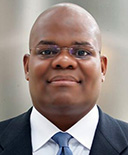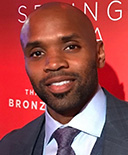Diversity test failure pt I: Dealing with racism and breaking through the glass ceiling
A lack of diversity is a problem across a number of professions and this week Creditflux is reporting on how this needs to be addressed in the CLO industry. The first installment of this three-part series draws upon the experiences of black people working in the CLO business.
---
The horrific killing of a black man, George Floyd, by a white police officer who knelt on his neck for nearly nine minutes, has caused international outrage, drawn millions into street protests and led to calls for action against racism all around the world.
Floyd’s death also draws attention to the fact that, seven years after the black lives matter movement began and four years after American footballer Colin Kaepernick first took a knee during the US national anthem to protest against racial inequality and oppression, systemic racism is still rife.
We can put up our billboards, tweet our outrage and voice our condemnation for the next few weeks. But then what next? The black lives matter movement will only succeed if it drives change in the way people and corporations go about their business.
The CLO community is not removed from this requirement. In all walks of life we laud diversity and with good reason. Bring together a diverse group of people and get them to draw on their experiences, character and upbringing and this will no doubt result in better idea generation, which is how businesses progress. By contrast, ideas generated from a group of people in the same demographic will elicit uniformity and this limitation ultimately leads to stagnation. Fresh perspectives always help.
In an industry as niche as the CLO market, it would be easy to lay blame at the entry level and say the talent pool for BAME (black, Asian and minority ethnic) candidates is low. But if that is the case, the system is broken and needs to be rebuilt. Business and society must do more to bring about racial equality.
A model 30 years ahead of its time
In the 1980s, First Chicago sourced diverse talent from the Consortium for Graduate study in Management (a non-profit organisation), which offered a pool of 150 top quality entry-level MBA applicants each year. The bank committed to hiring at least 10 individuals who were African American, or from other minority backgrounds.
Levoyd Robinson, who is now a partner at CLO manager CFI Partners, was one of the beneficiaries of this scheme.

But First Chicago took a different approach. “They paired me with a rock star,” he says. “I was the number one ranked analyst in the programme and they got the company’s top performer to mentor me on a day-to-day basis, along with the company CFO." Looking back, Robinson says that those eight years at First Chicago were some of the best of his career. He knows though that many others have not had similarly positive starts to their careers.
The experience of Kentay Miller, a managing director and structured finance compliance officer at MJX Asset Management in New York, seems likely to be more representative of the racial discrimination and bias black people face in structured finance firms.
“I worked for a CLO/hedge fund manager under the firm’s controller, who constantly reminded me that I was the only black person at the firm,” says Miller, of his experiences in the early 2000s. “It started with racial jokes being told in meetings in front of team members. I was expected to go along with the jokes as my non-black colleagues would remind me that ‘It’s just a joke, don’t take it personal.’ These jokes worsened over time and at some point this person asked me to share my thoughts on the notion that there is a genetic difference in intellect between white and black people.”

Another black official working in the structured credit market, who declines to be named, says that being a member of an ethic minority can hinder your chances of being promoted.
“It’s not outright racism, it’s more about who is connected with the boss at the Christmas party and who his golf buddies might be. Because most of the senior managers in our business are white, they have a natural affinity to people with similar backgrounds.” The official thinks the problem stems from universities. “I was the only black guy in my quant class — there were Asians but no black person. The class was mostly men.”
Robinson says he was fortunate that First Chicago’s head of human resources believed firmly that a diverse workplace delivers the best results. But today, there are fewer than 10 black people working in high profile buy-side positions across the global CLO market. Many firms hire from the same class, from the same universities, year upon year.
This needs to change, says Robinson. “The talent is out there and if you tell me that you’re not finding it, then you’re not trying hard enough.”
<<END>>
Related Stories
- CVC joins short-dated trend for latest US CLO 21 hours ago
- CSAM gets happy ending as CLO 69 prices 21 hours ago
- European WAL test language is getting a little looser finds Dealscribe 21 hours ago
- New short-dated CLO brings triple-As down to 132bps 1 day ago
- Oaktree makes it two new US CLOs this year 1 day ago
CLOs
- CVC joins short-dated trend for latest US CLO 21 hours ago
- CSAM gets happy ending as CLO 69 prices 21 hours ago
- European WAL test language is getting a little looser finds Dealscribe 21 hours ago
- New short-dated CLO brings triple-As down to 132bps 1 day ago
- Oaktree makes it two new US CLOs this year 1 day ago

